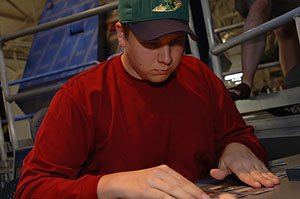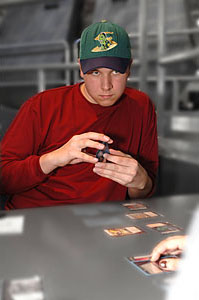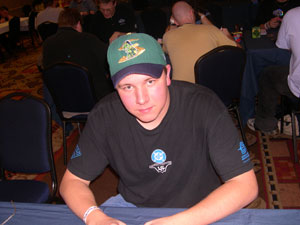I must be the luckiest guy on the planet. The powers that be at Metagame.com (which means my wonderful editor, Toby Wachter) have been so gracious as to allow me a crack at a second column. Honestly, I can’t contain my excitement.
To me, the most enjoyable aspect of this game is meeting new people and making new friends. We are lucky to have some of the most gracious and good-natured people in the world play our game, and now, it is my duty to let you find out about some of those awesome individuals.
 My first interviewee is Kyle Dembinski. I have known Kyle for a little over a year now, but it feels so much longer. He put the crush on me at my first Top 8 at the $10k Championship in Chicago (April 2005). Realizing that it’s not nice to beat on someone with as many tattoos as I have, he graciously allowed me to bunk with him for the New York Pro Circuit. We have been friends since, and in my opinion, he is a real up-and-comer who is just waiting to “really” bust onto the scene. I hope you enjoy getting to know Kyle a little bit better!
My first interviewee is Kyle Dembinski. I have known Kyle for a little over a year now, but it feels so much longer. He put the crush on me at my first Top 8 at the $10k Championship in Chicago (April 2005). Realizing that it’s not nice to beat on someone with as many tattoos as I have, he graciously allowed me to bunk with him for the New York Pro Circuit. We have been friends since, and in my opinion, he is a real up-and-comer who is just waiting to “really” bust onto the scene. I hope you enjoy getting to know Kyle a little bit better!
Shane: So, let’s get right to it. Who are you, and why do we care what you have to say?
Kyle: My name is Kyle Dembinski, I am an 18-year-old student that just graduated from high school, and I am a member of The Donkey Club, a.k.a., TDC. I have been in the Top 20 on Day 1 of the last four PCs and have Top 8’d in three $10Ks. Before I joined TDC, I tested with a local group of players that I organized in Kansas City. Dave Spears tried to get me to join up with him when he was on Realmworx a while ago, but nothing ever came of it. Recently in Atlanta, I lost to Neil Reeves for the 1,000th time, and he wanted to know if I would be interested in joining his team. The next weekend in Austin, I officially joined the team when, in the middle of a round, Dave Spears looked up, saw me, and said, “Welcome to TDC.”
Shane: Can you please tell us what it’s like going from a small, locally-based team to a national one?
 Kyle: Before I joined TDC, my playtest group was a group of five players from Kansas City that would travel around together. Testing for events was a lot harder. I had trouble finding people to play with more than just a few hours a week. I almost never felt comfortable with what I was taking to a tournament and just hoped to adjust to new decks at the event. I usually tried to talk with as many people online as possible in order to get a better feel for the field. Now that I am on TDC, I am able to playtest more (will be even more after the summer when I move to Michigan to go to college and will only be a few miles away from MJ) and usually have knowledge of the better decks that should be in the field.
Kyle: Before I joined TDC, my playtest group was a group of five players from Kansas City that would travel around together. Testing for events was a lot harder. I had trouble finding people to play with more than just a few hours a week. I almost never felt comfortable with what I was taking to a tournament and just hoped to adjust to new decks at the event. I usually tried to talk with as many people online as possible in order to get a better feel for the field. Now that I am on TDC, I am able to playtest more (will be even more after the summer when I move to Michigan to go to college and will only be a few miles away from MJ) and usually have knowledge of the better decks that should be in the field.
Shane: Everyone knew about the leak [of TDC’s PC deck] that came out. Could you give us your viewpoint on it?
Kyle: I didn't find out about the leak until a week before the PC and didn't realize the severity of it until I got to San Fran. I was pretty upset about the leaks, as it personally cost me one game. Overall, it cost our team a lot of money, as I am pretty confident that we would have had almost all of the Top 16 after Day 1.
Shane: Can you talk a little bit about your deck choice for PC San Francisco (“Ivy League”) and how you fared with it?
Kyle: I loved the deck. It is by far the best deck in the field and should win about 90% if played correctly without time restraints. The problem is that it is incredibly difficult to play properly, making it a deck that shouldn't be played by many people. I know I lost at least two games to play mistakes, and most likely, I made some more that I didn't realize. I started 7-0 with it, and then lost three in a row to Kim [Caton], Vidi [Wijaya], and Tim Batow. The losses to Kim and Tim were due to play mistakes, and the loss to Vidi was to the perfect row for him on turn 4.
Shane: How did Day 2 turn out for you?
Kyle: Day 2 was one of my better ones recently, which is sad. I went 5-4, going 1-2 with Morlock Evasion/Energy, then 2-1 and 2-1 with X-Men Energy with other teams splashed. I prefer the X-Men Energy strategy and tried to go that way anytime I thought it was open. Magnetic Force is just such a good card, and it seemed to come around so late.
Shane: Describe how you prepare for a Sealed event and why it is so difficult to grab those elusive 8-1 and 7-2 records.
Kyle: For X-Men Draft, everyone met at Gabe's house a few weeks before the PC to have a draft camp. I think I drafted ten times in two days. It helped tremendously in knowing the different archetypes available and what works together. I also tried to draft on VS'ed when I could. Draft is by far my weakest area, thus making it difficult for me to Top 8 despite the solid Day 1 finishes. I think the hardest thing is just adapting and reading the signals that are given. Draft in Vs. System is a lot harder than other trading card games since you have so few cards that you can cut. You really can't waste more than three or four picks early before you commit, or you won't have enough playables by the end.
Shane: Let's talk about Modern Age, as much as you are allowed. Do you have a deck of choice for Modern?
Kyle: I don't know what Modern is going to look like yet. I hope it isn't just about getting Fate Artifacts on the biggest guy the fastest and beating face. I hope there are more control decks. The problem is that the aggro decks are easier to play and easier to build, and the tournament system favors them. There isn't enough time for a lot of people to finish a game that goes 8 turns and requires five searches a turn.
 Shane: For Silver Age, there was a lot of talk about G'Lock, AGL, Good Guys, and other decks that existed before Silver Age. However, the Top 8 was full of new decks, for the most part (unless you count FTN's deck as just another Squad build, which I don't). Do you think that Good Guys will break through and become a contender in this format?
Shane: For Silver Age, there was a lot of talk about G'Lock, AGL, Good Guys, and other decks that existed before Silver Age. However, the Top 8 was full of new decks, for the most part (unless you count FTN's deck as just another Squad build, which I don't). Do you think that Good Guys will break through and become a contender in this format?
Kyle: I think Good Guys will be the baseline deck that people will start with. I don't think it will be played too much just because everyone knows about it, and nobody will play a deck that can't beat it.
Shane: What about Infinite Crisis Draft? What is your preferred drafting strategy, and could you give me a couple cards you consider first picks?
Kyle: I am probably not the person you want to get draft advice from, but from the first few drafts that I have done, I like Villains United a lot. I really don't like Shadowpact; I think they are a little too fragile. Just like other formats, the good first picks are the Finishing Moves, the combat pumps, and some of the better characters like Black Adam, Tenth Adam and Atom Smasher.
Shane: Lastly, I would like to give you an opportunity to impart any words that have done you well, or any strategy that you would like to give to other individuals.
Kyle: The best advice I can give to people is just to practice when you can and read about the game when you can't. I spend a lot of time just reading other people’s ideas on various websites, and I think it helps a lot. If nothing else, you get a feel for what people are going to be playing and some interesting rules that might not come up very often. Also, if you ever have a question about anything, ask a judge to make sure. As for words that have done me well, all I can say is, “This one’s on mom.”
Many thanks go out to Kyle Dembinski for being the first guinea pig to be interviewed. Hopefully you all enjoyed the insight that Kyle gave. If any of you know an individual who you think would be interesting to interview—an up-and-comer, for instance, or just a fun person—feel free to drop me a line at piercedlawyer@yahoo.com. Again, thanks for reading!